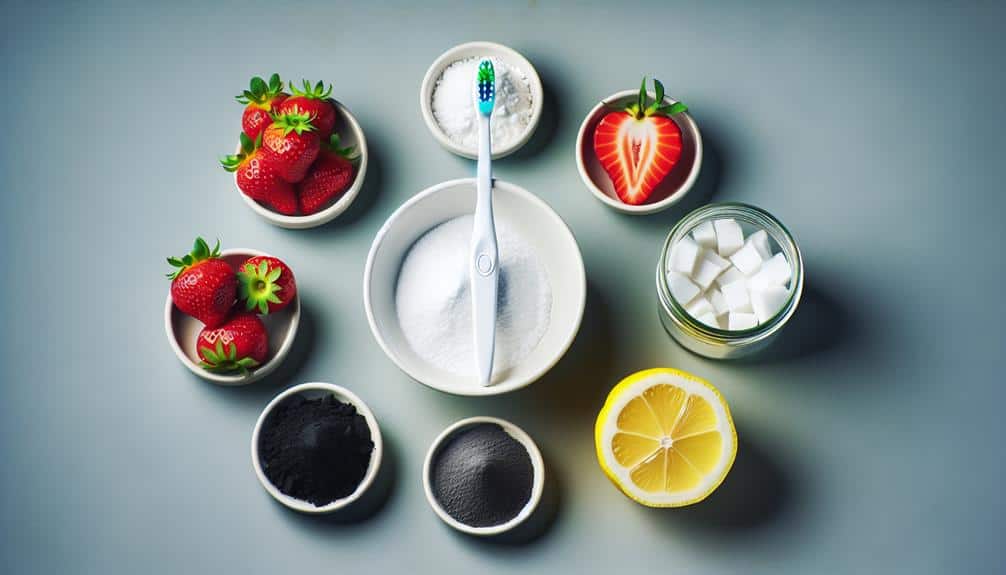To maintain lasting teeth whitening success, guarantee proper oral hygiene practices by mastering flossing techniques and considering dental sealants for added protection. Limit staining foods and beverages, opt for a teeth-friendly diet, and incorporate crunchy fruits and vegetables to preserve your bright smile. Regular dental check-ups, fluoride treatments, and professional cleanings are essential for sustaining whiter teeth.
Utilize whitening toothpaste consistently with a gentle brushing technique and alternate with regular toothpaste to manage sensitivity effectively. Avoid smoking and tobacco products as they can harm your dental aesthetics, and consider professional whitening treatments for safer and more enduring results. Achieving enduring brilliance in your smile demands a commitment to proven strategies that sustain your teeth whitening success.
Key Points
- Maintain good oral hygiene practices, including flossing and dental check-ups.
- Limit consumption of staining foods and beverages, opting for a teeth-friendly diet.
- Use whitening toothpaste consistently with proper brushing techniques.
- Avoid smoking and tobacco products to preserve dental aesthetics.
- Consider professional whitening treatments for long-lasting results.
Proper Oral Hygiene Practices
To maintain long-lasting teeth whitening success, practice proper oral hygiene habits consistently. Flossing techniques play an important role in keeping your teeth and gums healthy. When flossing, make sure to use a gentle back-and-forth motion to remove plaque and food particles from between your teeth. Proper flossing not only enhances the appearance of your teeth but also contributes to overall dental health.
In addition to flossing, consider the benefits of dental sealants. These thin protective coatings are applied to the chewing surfaces of your molars to prevent decay and staining. Dental sealants act as a barrier against bacteria and acids that can erode enamel, helping to maintain the brightness of your teeth over time.
Limit Staining Foods and Beverages
Limiting your intake of staining foods and beverages is crucial for maintaining the whiteness of your teeth over time. To keep your teeth bright, consider adopting a teeth-friendly diet that's low in foods and beverages known to cause staining. Coffee, tea, red wine, and colored sodas are common culprits that can stain your teeth. If you're unable to completely remove these from your diet, consider using a straw to minimize contact with your teeth.
In addition to monitoring what you consume, practicing good oral hygiene habits after consuming these staining foods and beverages can help prevent stains. Brushing your teeth or rinsing your mouth with water after consuming them can reduce the likelihood of stains setting in. Additionally, incorporating crunchy fruits and vegetables like apples and carrots into your diet can naturally help clean your teeth and prevent staining.
Regular Dental Check-ups
Regular dental check-ups are essential for maintaining peak oral health and preventing potential issues from developing unnoticed. When it comes to achieving long-lasting teeth whitening success, staying on top of your regular dental visits is important. Here are some key reasons why these check-ups are necessary:
- Fluoride Treatments: During your dental check-ups, your dentist may recommend fluoride treatments to help strengthen your enamel and reduce teeth sensitivity. Fluoride can protect your teeth from decay and improve their overall health.
- Dental Cleanings: Professional dental cleanings are essential to remove plaque buildup that regular brushing and flossing may miss. This plaque removal not only helps in maintaining a bright smile but also prevents gum disease and other oral health issues.
- Early Issue Detection: Regular dental check-ups allow dentists to spot any potential problems early on, helping to address them before they worsen. This proactive approach can save you from more extensive treatments down the line and contribute to the longevity of your teeth whitening results.
Use Whitening Toothpaste
Maintaining consistency with using whitening toothpaste can further enhance the results of your teeth whitening efforts, ensuring a brighter smile for longer. When selecting a whitening toothpaste, look for one that contains gentle abrasives or polishing agents to help remove surface stains effectively. Following the recommended brushing technique is crucial – utilize a soft-bristled toothbrush and gentle, circular motions to prevent damaging your enamel while still effectively cleaning your teeth.
Tooth sensitivity is a common concern when using whitening toothpaste. If you experience sensitivity, consider alternating between your regular toothpaste and the whitening one. This can help manage sensitivity while still benefiting from the whitening effects. Additionally, using a toothpaste designed for sensitive teeth or applying a desensitizing toothpaste before whitening can also help alleviate discomfort.
Avoid Smoking and Tobacco Products
To maintain ideal teeth whitening success, it's important to steer clear of smoking and tobacco products due to their harmful effects on dental aesthetics and overall oral health. Tobacco cessation is vital for preserving your bright smile. Here are some reasons why avoiding smoking and tobacco products is essential:
- Staining: Tobacco products contain tar and nicotine that can cause stubborn stains on your teeth, undoing the effects of any whitening treatment.
- Gum Health: Smoking can lead to gum disease, which not only impacts the health of your gums but also affects the appearance of your teeth.
- Whitening Alternatives: Instead of risking the whiteness of your teeth with tobacco products, consider alternative whitening methods like professional whitening treatments or whitening strips. These options are much safer and more effective in the long run.
Frequently Asked Questions
Can Teeth Whitening Affect the Sensitivity of My Teeth?
Teeth whitening can indeed affect tooth sensitivity. To manage this, choose whitening products with desensitizing agents like potassium nitrate. These can help reduce discomfort while still achieving a brighter smile. Selecting the right product is key for sensitivity management.
Are There Any Alternative Methods for Whitening Teeth Besides Toothpaste and Professional Treatments?
To brighten your smile beyond toothpaste and professional treatments, consider natural remedies like baking soda or activated charcoal. Explore home kits with ingredients like hydrogen peroxide. These alternatives offer additional methods for achieving a radiant smile.
How Long Does Teeth Whitening Typically Last Before Needing a Touch-Up?
Teeth whitening typically lasts six months to two years before needing a touch-up. To prolong results, maintain good oral hygiene, limit staining foods and drinks, and use touch-up products as needed. Consistency is key for long-lasting brightness.
Can Certain Medications or Medical Conditions Impact the Effectiveness of Teeth Whitening Products?
Certain medications and medical conditions can indeed impact the effectiveness of teeth whitening products. Factors like medication side effects or medical conditions affecting enamel can influence whitening success and may increase sensitivity concerns.
Is It Safe to Use DIY Teeth Whitening Remedies Found Online?
Thinking of trying DIY teeth whitening remedies online? Be cautious! DIY risks include enamel damage and gum irritation. Prioritize safety precautions like consulting a dentist and using reputable products for a healthier smile.




